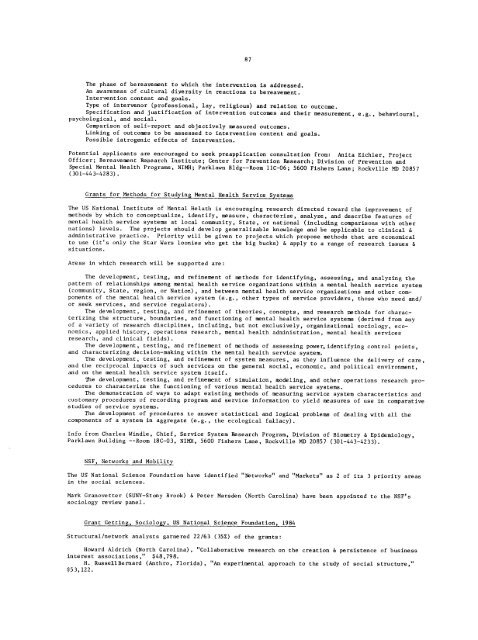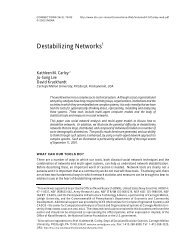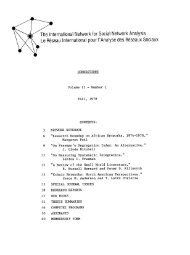(1985). Levine's Atlas of Corporate Interlocks. Connections ... - INSNA
(1985). Levine's Atlas of Corporate Interlocks. Connections ... - INSNA
(1985). Levine's Atlas of Corporate Interlocks. Connections ... - INSNA
Create successful ePaper yourself
Turn your PDF publications into a flip-book with our unique Google optimized e-Paper software.
8 7<br />
The phase <strong>of</strong> bereavement to which the intervention is addressed .<br />
An awareness <strong>of</strong> cultural diversity in reactions to bereavement .<br />
Intervention content and goals .<br />
Type <strong>of</strong> intervenor (pr<strong>of</strong>essional, lay, religious) and relation to outcome .<br />
Specification and justification <strong>of</strong> intervention outcomes and their measurement,<br />
psychological, and social .<br />
e .g ., behavioural,<br />
Comparison <strong>of</strong> self-report and objectively measured outcomes .<br />
Linking <strong>of</strong> outcomes to be assessed to intervention content and goals .<br />
Possible iatrogenic effects <strong>of</strong> intervention .<br />
Potential applicants are encouraged to seek preapplication consultation from : Anita Eichler, Project<br />
Officer ; Bereavement Research Institute ; Center for Prevention Research ; Division <strong>of</strong> Prevention and<br />
Special Mental Health Programs, NIMH ; Parklawn Bldg--Room 11C-06 ; 5600 Fishers Lane ; Rockville MD 20857<br />
(301-443-4283) .<br />
Grants for Methods for Studying Mental Health Service Systems<br />
The US National Institute <strong>of</strong> Mental Helath is encouraging research directed toward the improvement <strong>of</strong><br />
methods by which to conceptualize, identify, measure, characterize, analyze, and describe features <strong>of</strong><br />
mental health service systems at local community, State, or national (including comparisons with other<br />
nations) levels . The projects should develop generalizable knowledge and be applicable to clinical &<br />
administrative practice . Priority will be given to projects which propose methods that are economical<br />
to use (it's only the Star Wars loonies who get the big bucks) & apply to a range <strong>of</strong> research issues &<br />
situations .<br />
Areas in which research will be supported are :<br />
The development, testing, and refinement <strong>of</strong> methods for identifying, assessing, and analyzing the<br />
pattern <strong>of</strong> relationships among mental health service organizations within a mental health service system<br />
(community, State, region, or Nation), and between mental health service organizations and other components<br />
<strong>of</strong> the mental health service system (e .g ., other types <strong>of</strong> service providers, those who need and/<br />
or seek services, and service regulators) .<br />
The development, testing, and refinement <strong>of</strong> theories, concepts, and research methods for characterizing<br />
the structure, boundaries, and functioning <strong>of</strong> mental health service systems (derived from any<br />
<strong>of</strong> a variety <strong>of</strong> research disciplines, including, but not exclusively, organizational sociology, economics,<br />
applied history, operations research, mental health administration, mental health services<br />
research, and clinical fields) .<br />
The development, testing, and refinement <strong>of</strong> methods <strong>of</strong> assessing power, identifying control points,<br />
and characterizing decision-making within the mental health service system.<br />
The development, testing, and refinement <strong>of</strong> system measures, as they influence the delivery <strong>of</strong> care,<br />
and the reciprocal impacts <strong>of</strong> such services on the general social, economic, and political environment,<br />
and on the mental health service system itself .<br />
The development, testing, and refinement <strong>of</strong> simulation, modeling, and other operations research procedures<br />
to characterize the functioning <strong>of</strong> various mental health service systems .<br />
The demonstration <strong>of</strong> ways to adapt existing methods <strong>of</strong> measuring service system characteristics and<br />
customary procedures <strong>of</strong> recording program and service information to yield measures <strong>of</strong> use in comparative<br />
studies <strong>of</strong> service systems .<br />
The development <strong>of</strong> procedures to answer statistical and logical problems <strong>of</strong> dealing with all the<br />
components <strong>of</strong> a system in aggregate (e .g ., the ecological fallacy) .<br />
Info from Charles Windle, Chief, Service System Research Program, Division <strong>of</strong> Biometry & Epidemiology,<br />
Parklawn Building --Room 18C-03, NIMH, 5600 Fishers Lane, Rockville MD 20857 (301-443-4233) .<br />
NSF, Networks and Mobility<br />
The US National Science Foundation have identified "Networks" and "Markets" as 2 <strong>of</strong> its 3 priority areas<br />
in the social sciences .<br />
Mark Granovetter (SUNY-Stony Brook) & Peter Marsden (North Carolina) have been appointed to the NSF's<br />
sociology review panel .<br />
Grant Getting, Sociology, US National Science Foundation, 1984<br />
Structural/network analysts garnered 22/63 (35%) <strong>of</strong> the grants :<br />
Howard Aldrich (North Carolina), "Collaborative research on the creation & persistence <strong>of</strong> business<br />
interest associations," $48,798 .<br />
H . RussellBernard (Anthro, Florida), "An experimental approach to the study <strong>of</strong> social structure,"<br />
$53,122 .

















